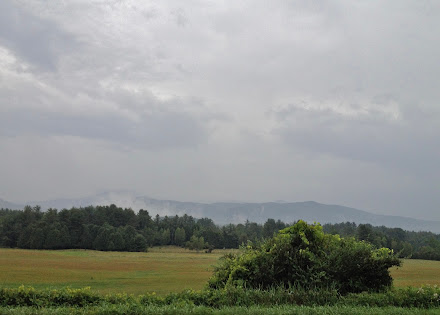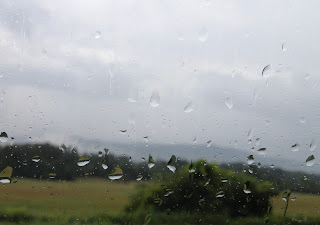August 12
To Conantum by boat. To-day there is an uncommonly strong wind, against which I row, yet in shirt-sleeves, trusting to sail back. It is southwest.
August 12, 2913
The Bidens Beckii yellows the side of the river just below the Hubbard Path, but is hardly yet in fullest flower generally.
I see goldfinches nowadays on the lanceolate thistles, apparently after the seeds.
It takes all the heat of the year to produce these yellow flowers. It is the 3 o'clock p. m. of the year when they begin to prevail, — when the earth has absorbed most heat, when melons ripen and early apples and peaches. It is already the yellowing year.
Viburnum nudum berries generally green, but some, higher and more exposed, of a deep, fiery pink on one cheek and light green on the other, and a very few dark purple or without bloom, black already. I put a bunch with only two or three black ones in my hat, the rest pink or green. When I got home more than half were turned black, — and ripe !! A singularly sudden chemical change. They are a very pretty, irregularly elliptical berry, one side longer than the other, and particularly interesting on account of the mixture of light-green, deep-pink, and dark-purple, and also withered berries, in the same cyme.
The wind is autumnal and at length compels me to put on my coat.
I bathe at Hubbard's. The water is rather cool, comparatively.
As I look down-stream from southwest to northeast, I see the red under sides of the white lily pads about half exposed, turned up by the wind to [an] angle of 45 ° or more. These hemispherical red shields are so numerous as to produce a striking effect on the eye, as of an endless array of forces with shields advanced; sometimes four or five rods in width.
Off Holden Woods a baffling counter wind as usual (when I return), but looking up-stream I see the great undulations extending into the calm from above, where the wind blows steadily.
There are but few haymakers left in the meadows.
Off Holden Woods a baffling counter wind as usual (when I return), but looking up-stream I see the great undulations extending into the calm from above, where the wind blows steadily.
There are but few haymakers left in the meadows.
The woodbine on rocks in warm and dry places is now more frequently turned, a few leafets bright-scarlet.
The now quite common goldenrods fully out are what I have called stricta and also the more strict puberula (?). The arguta and odora are not abundant enough to make an impression. The Solidago nemoralis is not yet generally out.
The common asters now are the patens, dumosus, Radula, and Diplopappus umbellatus.
H. D. Thoreau, Journal, August 12, 1854
To Conantum by boat. See August 12, 1853 ("To Conantum by boat, berrying, with three ladies.”)\
H. D. Thoreau, Journal, August 12, 1854
To Conantum by boat. See August 12, 1853 ("To Conantum by boat, berrying, with three ladies.”)\
Strong wind, against which I row, . . . trusting to sail back. See May 28, 1855 ("Yesterday left my boat at the willow opposite this [Conantum] Cliff, the wind northwest. Now it is southeast, and I can sail back.")
The red under sides of the white lily pads. See June 29, 1852 ("This is one of the aspects of the river now."); June 30, 1859 (" this not a fall phenomenon yet."August 24,1854 (" It is not till August, methinks, that they are turned up conspicuously.”)
It is the 3 o'clock p. m. of the year . . . when the earth has absorbed most heat, when melons ripen . . .It is already the yellowing year. See July 26, 1853 ("This the afternoon of the year."); August 10, 1853 ("That month, surely, is distinguished when melons ripen. July could not do it."); August 19, 1853 ("The day is an epitome of the year."); August 23, 1853 "I am again struck by the perfect correspondence of a day – say an August day – and the year. I think that a perfect parallel may be drawn between the seasons of the day and of the year.”); Walden, "Spring" ("The night is the winter, the morning and evening are the spring and fall, and the noon is the summer.")
Viburnum nudum berries generally green. See August 10, 1853 ("What a moist, fertile heat now! I see naked viburnum berries beginning to turn. Their whiteness faintly blushing."); August 15, 1852 ("Some naked viburnum berries are quite dark purple amid the red, while other bunches are wholly green yet."); August 24, 1851 ("Is that the naked viburnum, so common, with its white, red, then purple berries, in Hubbard's meadow?"); August 24, 1852 ("The Viburnum nudum shows now rich, variegated clusters amid its handsome, firm leaves, bright rosy-cheeked ones mingled with dark-purple.") See also A Book of the Seasons, by Henry Thoreau, Viburnum
I bathe at Hubbard's. The water is rather cool, comparatively. See August 14, 1854 ("Though yesterday was quite a hot day, I find by bathing that the river grows steadily cooler, "): September 2, 1854 ("Bathe at Hubbard’s. The water is surprisingly cold on account of the cool weather and rain, but especially since the rain of yesterday morning. It is a very important and remarkable autumnal change. It will not be warm again probably"); September 12, 1854 ("I find it colder again than on the 2d, so that I stay in but a moment."); September 27, 1856 ("Bathed at Hubbard's Bath, but found the water very cold. Bathing about over”) See also A Book of the Seasons, by Henry Thoreau, The Luxury of Bathing
August 12. See A Book of the Seasons, by Henry Thoreau, August 12.
The Bidens Beckii
yellows the side of the river –
the yellowing year.
A Book of the Seasons, by Henry Thoreau, The yellow afternoon of the year.
A Book of the Seasons, by Henry Thoreau
"A book, each page written in its own season,
out-of-doors, in its own locality."
~edited, assembled and rewritten by zphx © 2009-2024
https://tinyurl.com/hdt-540812






